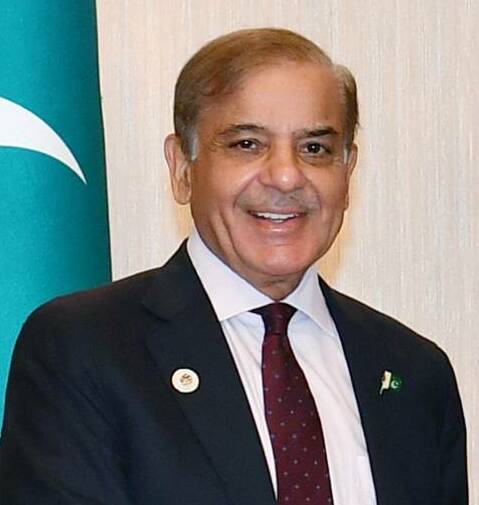Prime Minister Sharif denounces PTI’s attacks on the chief of army staff and highlights ongoing challenges including terrorism and diplomatic incidents
Prime Minister Shehbaz Sharif launched a strong denunciation against the Pakistan Tehreek-e-Insaf (PTI) party’s recent propaganda targeting Chief of Army Staff (COAS) General Syed Asim Munir and his family. Addressing a federal cabinet meeting on July 24, 2024, Sharif labelled the attacks as “intolerable” and deeply distressing.
The premier condemned the PTI for employing new tactics to destabilize Pakistan following the tumultuous events of May 9, 2023. Sharif accused the party of continuing to undermine the nation’s stability and criticized their recent actions as part of a broader effort to disrupt the country’s foundations.
Embed from Getty ImagesIn his address, Sharif also voiced his grave concerns over the escalating violence in Palestine. He criticized Israel’s military actions, which have reportedly resulted in the deaths of 40,000 Palestinians, and expressed frustration over the lack of impact from United Nations resolutions. The Prime Minister emphasized the urgent need for global condemnation of the ongoing atrocities.
Sharif further addressed the troubling incidents involving Pakistani diplomatic missions abroad. Recent attacks on the Pakistani consulate in Germany and London were described by Sharif as “deeply unfortunate.” He stressed the importance of safeguarding Pakistani embassies and called on the relevant countries to take responsibility for ensuring their protection. Sharif revealed that the foreign minister had already initiated measures to address these diplomatic security concerns.
Turning to regional security issues, Sharif highlighted Afghanistan’s involvement in recent terrorism spikes, specifically noting the Tehreek-e-Taliban Pakistan (TTP) attacks. He expressed dismay over the TTP’s violent actions, which have disrupted peace and affected businesses in Pakistan. The Prime Minister emphasized that while Pakistan is ready to defend itself, it seeks resolution through dialogue and peaceful means. He noted ongoing discussions with Afghanistan and criticized the lack of reciprocation for Pakistan’s hospitality toward Afghan refugees.
Sharif assured the nation that Pakistan’s armed forces are committed and ready to handle any threats. He stressed the need for national unity to protect the country, its people, and its armed forces. The Prime Minister also addressed the recent surge in terrorism in Khyber Pakhtunkhwa (K-P) and Balochistan, attributing it to a coordinated conspiracy involving neighboring countries.
In a move to bolster Pakistan’s economic and tourism sectors, Sharif announced a decision to eliminate visa fees for 126 countries. This initiative aims to facilitate business, attract investors, and boost tourism, including religious tourism where Pakistan has significant potential. The waiver is expected to be offset by increased foreign exchange earnings from these sectors. Sharif also highlighted that visas would be processed within 24 hours through an electronic travel authorization system and that E-gates would be installed at key locations including Gwadar Port and major airports.
Finally, the cabinet deferred decisions on banning PTI and invoking Article 6 against key figures, including former President Arif Alvi, PTI founder Imran Khan, and former Deputy Speaker Qasim Suri. This deferment is pending further consultations with the Pakistan Peoples Party (PPP) and other coalition partners before revisiting the issues in a subsequent cabinet session.
Analysis:
Political: PM Shehbaz Sharif’s denunciation of PTI’s propaganda underscores a critical moment in Pakistan’s political landscape. By condemning the attacks on the COAS and highlighting the threats to national stability, Sharif reinforces the government’s stance against opposition parties undermining state institutions. This move could lead to heightened political tension and may influence upcoming political strategies and alliances. The emphasis on national unity and defence readiness reflects a strategic approach to consolidating support amid ongoing political challenges.
Social: Sharif’s comments on the propaganda against the COAS and the broader issues of terrorism and violence reflect societal concerns about national security and stability. The focus on maintaining the integrity of state institutions resonates with public sentiments about the importance of protecting leadership and ensuring a secure environment for all citizens. Additionally, the announcement of visa fee waivers aims to foster a more open and inviting atmosphere, potentially enhancing social interactions and cultural exchanges.
Racial: The Prime Minister’s address touches on complex geopolitical issues, including the conflict in Palestine and Afghanistan’s role in regional terrorism. The racial and ethnic dimensions of these issues are significant, as they involve diverse groups and nations. Sharif’s statements reflect a broader concern about international and inter-regional relationships and their impact on Pakistan. His comments about Afghan refugees and terrorism also highlight the challenges of managing diverse and sometimes contentious relationships with neighbouring countries.
Gender: While the Prime Minister’s address does not directly address gender issues, the broader context of national security and political stability can have indirect effects on gender dynamics. The focus on maintaining security and combating terrorism is crucial for creating a stable environment where all individuals, regardless of gender, can thrive. Additionally, the Prime Minister’s leadership style and emphasis on unity may influence gender perceptions within political and social contexts.
Economic: The decision to waive visa fees for 126 countries is a significant economic move aimed at boosting Pakistan’s tourism and investment sectors. By removing financial barriers for travellers, Pakistan seeks to attract more international visitors and investors, potentially leading to increased economic activity and growth. The implementation of E-gates and expedited visa processing also aims to enhance the efficiency of the travel experience, which could further contribute to economic benefits.
